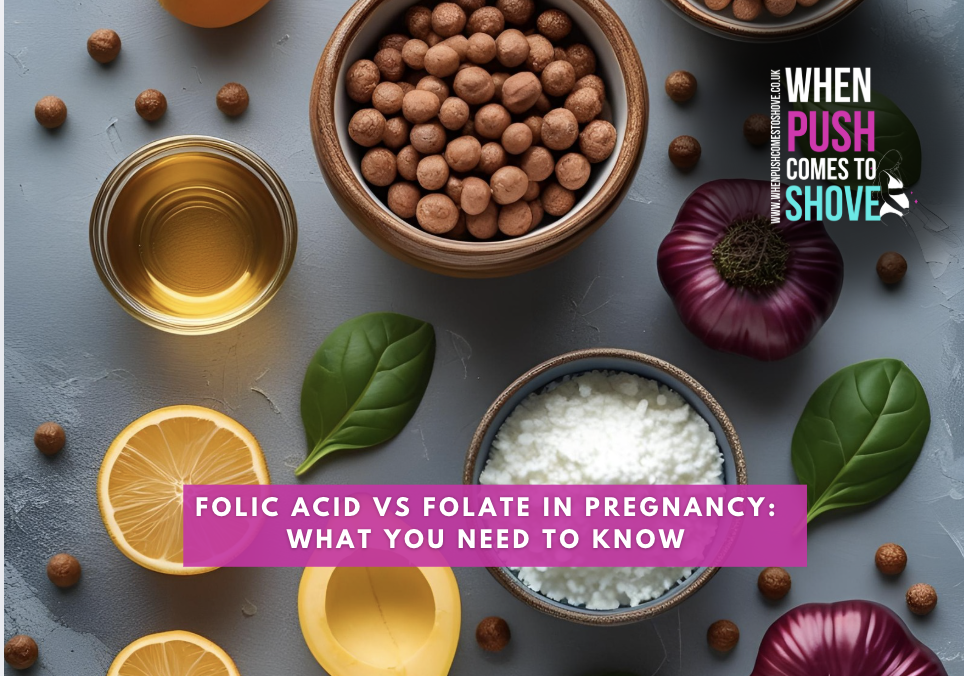Not long ago, someone reached out to me on Instagram with a question many women have when preparing for pregnancy:
“What would you say is better, folic acid or folate for the health side of things with pregnancy?
It’s a brilliant question because almost every NHS leaflet, GP, or Google search will tell you to take folic acid if you’re trying to conceive. Yet many women are also hearing whispers about folate and wondering if there’s a difference. When you’re thinking about your fertility, your biological clock, and the health of your baby, it matters to understand this clearly.
Why There’s So Much Confusion About Folic Acid vs Folate
In order to make an informed choice, we need reliable information. But unbiased information is hard to come by. If you’ve ever typed “folic acid vs folate” into Google, you’ve probably noticed that the first page of results almost always pushes folic acid. This isn’t necessarily because folic acid is better, it’s because government guidelines, NHS recommendations, and pharmaceutical-funded studies dominate search rankings.
Google’s algorithm favours large institutions and high-authority websites. That means the content you see first is usually backed by organisations that already have influence, not necessarily by what is most accurate or balanced. Alternative perspectives, like nutritional science that looks at the natural form of folate, are often buried further down in search results, making them harder to find. This is why so many women feel torn. On one hand, the NHS is clear: take folic acid. On the other, natural health practitioners and independent researchers point out that folate is the form your body actually recognises and uses. Both voices exist, but only one is amplified in the mainstream.
What’s the Difference Between Folic Acid and Folate?
Although the names sound similar], folic acid and folate are not the same thing.
Folate is the natural form of vitamin B9. You’ll find it in foods like leafy greens, beans, citrus fruit, and liver. When you eat folate, your body can recognise it and use it straight away.
Folic acid is the synthetic version of vitamin B9. It doesn’t exist in nature. Your body has to convert it into an active form before it can be used.
The challenge is that not everyone converts folic acid efficiently. Around 40–60% of people carry a genetic variation (MTHFR) that makes this process harder. If folic acid isn’t converted properly, it can build up in the blood as “unmetabolised folic acid,” which some studies suggest may be linked with health issues. Now, we can look at this in a couple of ways. One lens is frustration: “Why doesn’t my body just do what it’s supposed to?” Another lens is curiosity: “Why might nature have designed us this way?”
It could be that this variation isn’t a “mistake” at all, but part of human diversity. Maybe at different points in history, when our diets were richer in natural folate, the body didn’t need to process synthetic folic acid, because it didn’t exist. Perhaps this genetic difference acted as a kind of protective filter, encouraging us to source nutrients in their natural forms rather than relying on man-made versions. Whether or not that’s the full story, the point isn’t to demonise folic acid or to create fear. It’s to understand that our bodies don’t all work in identical ways, and that what the system presents as a one-size-fits-all solution doesn’t always respect human variation.
I don’t think folic acid is “bad” or unsafe, it means it isn’t identical to folate, and the body doesn’t always handle it in the same way. Folate, especially in its methylated form (sometimes labelled as “methylfolate” or “5-MTHF”), bypasses this problem because it’s already in the form your body uses.
Are There Risks With Taking Too Much Folic Acid?
For decades, folic acid has been promoted as a must-have supplement for pregnancy. And it’s true that vitamin B9, in either form, plays a vital role in preventing neural tube defects. But more recent research has raised questions about what happens when folic acid levels get too high, especially if the body struggles to process it efficiently.
Some studies suggest that excess, unmetabolised folic acid may be linked with certain developmental issues, particularly in what’s known as midline development. This includes things like tongue tie, lip ties, or in rare cases, other forms of tissue overgrowth. These findings don’t mean folic acid directly “causes” these problems for everyone, but they do highlight that the blanket advice to take folic acid may not be the full picture.
There are also broader questions about whether high levels of synthetic folic acid could affect long-term health by masking vitamin B12 deficiency or altering how genes are expressed. The science is still evolving, and researchers don’t all agree. What’s clear is that the conversation is more complex than “just take folic acid because Google says so.”
This is why it’s worth looking at folate as an alternative because folate is the form your body already recognises.
The Benefits of Folate in Pregnancy
No matter which form you choose, the reason folate is talked about so much in pregnancy is because it’s essential. Folate plays a central role in cell division, DNA repair, and red blood cell production, all of which are happening at lightning speed when you’re growing a baby.
The best known benefit is its role in reducing the risk of neural tube defects such as spina bifida. This is why NHS guidelines emphasise folic acid supplements, because they do work to raise folate levels in the blood. But when we look at folate specifically, the benefits go beyond just the neural tube.
Some of the key roles of folate in pregnancy include:
Supporting healthy placenta function — folate is crucial for proper blood flow and nutrient transfer between mother and baby.
Reducing the risk of pre-eclampsia — by supporting blood vessel health and blood volume expansion.
Protecting maternal mental health — folate is deeply involved in methylation, which affects neurotransmitters like serotonin and dopamine. Low folate has been linked with higher risk of depression.
Encouraging healthy growth overall — from skeletal development to the formation of organs, folate is a building block in every stage of pregnancy.
When folate is consumed in its natural or methylated form (5-MTHF), it bypasses the need for genetic conversion and is ready to be used by the body. That means for women who struggle with processing synthetic folic acid, folate can offer a more efficient and biologically natural way to meet pregnancy needs.
It’s also worth remembering that folate comes packaged in foods with a whole host of other supportive nutrients suc as iron, vitamin C, magnesium, antioxidants. Nature rarely delivers vitamins in isolation, and that synergy is part of what makes food based folate so powerful.
Best Natural Sources of Folate During Pregnancy
One of the simplest ways to increase folate intake is through food. Folate-rich foods give your body the form of B9 it already knows how to use, along with a spectrum of other supportive nutrients. Some of the best sources include:
Leafy greens such as spinach, kale, and romaine lettuce
Beans and lentils
Asparagus and broccoli
Avocado
Citrus fruits
Liver (if tolerated, this is one of the richest natural sources)
These foods not only provide folate but also deliver fibre, minerals, and antioxidants that work together to support a healthy pregnancy.
Choosing a Folate Supplement Without the Junk
For many women, food alone isn’t always enough, especially when preparing for pregnancy or during the first trimester, when folate needs are higher. In this case, supplements can be a helpful bridge. But not all supplements are created equal.
Most supermarket and pharmacy brands contain fillers, binders, and synthetic additives. These ingredients don’t contribute anything nutritionally, they’re often there to bulk out the capsule, improve shelf life, or make the product cheaper to produce. Common fillers include things like magnesium stearate, titanium dioxide, and artificial colours.
The problem is that these additives can sometimes irritate the gut, create unnecessary burden on the liver, or in sensitive women, trigger inflammatory responses. During pregnancy, when your body is already working hard, the last thing you want is extra “noise” from things that don’t belong there.
When choosing a supplement, look for:
Methylfolate (5-MTHF) or L-methylfolate on the label (the active form your body can use straight away).
Brands that are free from artificial binders, fillers, and colourings.
Third-party testing for purity and quality.
By prioritising clean supplements, you’re not only getting the form of folate your body can absorb most efficiently, but also avoiding unnecessary chemicals that do nothing for you or your baby.
Trust Yourself Above All
At the end of the day, the choice between folic acid and folate isn’t about blindly following one side or the other. It’s about learning to trust yourself.
Don’t just listen to the NHS. Don’t just listen to me. When we hand over our wellbeing entirely to outside voices, we risk losing touch with our own inner compass. This is how trauma so often begins, when we outsource our authority, ignore what our gut is telling us, and forget who we are.
Take what resonates, leave what doesn’t, and always do your own research. Your body is wise. Your instincts matter. The most powerful thing you can do for yourself and your baby is to take radical responsibility for your health and choices. That doesn’t mean doing it all alone, it means making decisions from a place of sovereignty rather than fear.
Pregnancy, birth, and motherhood are not medical events. They are profound rites of passage. And when you approach them from a place of self-trust, you create the conditions for deep healing, for yourself and for generations to come.
Join the Awakened Mums Support Circle
If you’re looking for a space where you can ask these kinds of questions, feel truly heard, and receive support beyond the one-size-fits-all advice, I created the Awakened Mums Support Circle for you.
For just £7.99 a month, you’ll receive:
A private WhatsApp group of like-minded women and birth workers walking the same path
Access to all live guest sessions with powerful speakers in birth, healing, and sovereignty
A full replay and resource library to revisit anytime
Discounted 1:1 support with me, so you can receive personalised guidance at an exclusive member rate
Monthly drop-in clinics on Zoom, where you can bring your questions directly to women’s health experts
15% off all courses — whether you’re preparing for birth or training as a birth worker
Early access to courses and retreats
But more than the practical benefits, this is a safe space to feel held. From preconception to parenting, whether you’re planning a freebirth, walking the birthkeeper path, or simply seeking truth, you’ll be part of a circle that understands.
This isn’t a surface-level group. It’s for women ready to look deeper, to see that the birth system isn’t just broken, but also a mirror of unhealed wounds, generational fear, and our collective disconnection from the sacred.
If you’ve ever felt alone, misunderstood, or dismissed for questioning the narrative, this is where you’ll finally feel at home.
Click here to join the Awakened Mums Support Circle today and step into a community that sees you.
References




